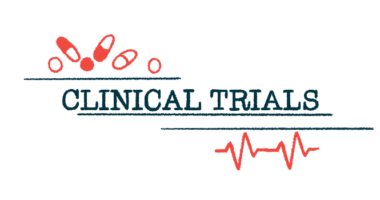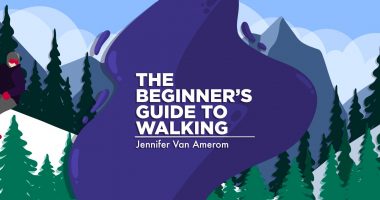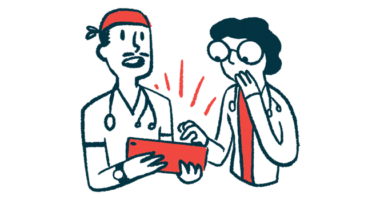When coping with comorbidities, we need access to care that works
Noticing a small earlobe bump leads to a relapsing polychondritis diagnosis

As I do on any typical morning, I peered at my reflection in the mirror, squinting until I managed to insert my contacts. On this particular morning, however, despite my blurred vision, I couldn’t help but notice a peculiar bump on my right ear. “What fresh nightmare is this?” I muttered to myself.
The cartilage appeared inflamed, with a small pea-sized protrusion. It was neither painful nor bothersome, but throughout the day, whenever I glimpsed in the mirror, I couldn’t help but fixate on this anomaly.
Within two weeks, a second bump, similar in size, appeared on my earlobe beside my ear piercing. Because of our healthcare system here in Canada, I had to wait six weeks to see an otolaryngologist (an ear, nose, and throat specialist). I attended the appointment with dread, assuming that both bumps would be drained, but that wasn’t the result.
It turns out that I have relapsing polychondritis, a rare disorder that causes inflammation and deterioration of cartilage or connective tissue.
I left the appointment irritated. This ailment is yet another caused by the weakened immune system that’s part of my neuromyelitis optica spectrum disorder (NMOSD). The otolaryngologist gave me the option of taking antibiotics that might treat the bumps or our wonder drug, prednisone, which will lessen the inflammation. Neither option is one I want to pursue, as the bumps aren’t noticeable unless you look closely and there’s no guarantee that either option will work, let alone prevent any recurrences.
The frustrations of NMOSD patients
Each time I pause to contemplate, I’m reminded of the unpredictable and unnerving nature of NMOSD. At any given moment, another health issue could arise, either as a consequence of NMOSD or from the heightened vulnerability stemming from my compromised immune system.
Back when I received my initial diagnosis, another patient cautioned me that being unwell is a full-time occupation. Now, after 14 years of living with this condition, I can comprehend the depth of that statement.
If dealing with surprise ailments isn’t frustrating or difficult enough, I find it particularly exasperating that the disabled, who are among the more vulnerable members of society, often have the least access to vital resources.
If it weren’t for the private healthcare provided by my husband’s employer, I’d be forced to pay out of pocket for a significant portion of my prescription costs. I also wouldn’t have the luxury of access to therapies like massage, acupuncture, or ongoing physiotherapy, all of which are essential for my self-care and well-being. They’re necessary to level the playing field with the rest of society.
The isolation dilemma: Exclusion versus exposure
When reviewing the fine print for most activities, particularly indoor ones, I’ll often encounter a disclaimer like this one: “This activity is safe for all, except the elderly, those under the age of 5, and those with a weakened or compromised immune system. By participating, you acknowledge the potential risk of exposure to airborne illnesses, including COVID-19.”
Before committing to an event, I weigh the pros and cons in my head. Is my absence likely to disappoint others, or is my presence merely nice to have? Do I know if anyone attending has recently recovered from an illness? How close will I be to others, and what’s the duration of the event? Is it a physically strenuous activity involving heavy breathing and perspiration, or is it more sedentary?
I won’t ever be certain, but my recent polychondritis diagnosis was probably from an infection acquired at some event. At times, I imagine a scenario in the afterlife when a higher power reveals something quite devastating. “Remember that event you were hesitant to attend last month, but your friends persuaded you to go? Well, the new friend seated to your right infected you with common bacteria your body couldn’t handle, leading to your current situation.”
Still, it’s dawned on me that I already grapple with an abundance of stressors in this life, rendering it unnecessary to fret over the potential ones in the afterlife.
Enhancing protection for the vulnerable population
I’m still searching for a solution that safeguards patients with NMOSD or other rare diseases. A promising starting point lies in cultivating understanding and compassion and moving away from ableism.
In cases when people are diagnosed with a permanent physical ailment, certain therapies, such as massage and Pilates, ought to be accessible at no cost. We should also offer support services, like counseling, for caregivers and close family members to help them gain a deeper insight into the daily struggles of the chronically ill.
I welcome your suggestions on NMOSD comorbidities and complementary treatments. Please feel free to share them in the comments section below.
Note: Neuromyelitis News is strictly a news and information website about the disease. It does not provide medical advice, diagnosis, or treatment. This content is not intended to be a substitute for professional medical advice, diagnosis, or treatment. Always seek the advice of your physician or other qualified health providers with any questions you may have regarding a medical condition. Never disregard professional medical advice or delay in seeking it because of something you have read on this website. The opinions expressed in this column are not those of Neuromyelitis News or its parent company, Bionews, and are intended to spark discussion about issues pertaining to neuromyelitis optica spectrum disorder (NMOSD).







Comments
Pauline Richardson
Hi Jennifer,
Happy Saturday!!
I hope today is a great day for you, if not you can make it as you have done on many other occasions. We cannot allow NMOSD and its residual effects to control our lives. It is said if you don't use it you will lose it.
Your articles are very informative and supportive. Yes, I agree being diagnosed with NMOSD myself, I have found its management can be frustrating if you allow it. I also agree it's a full-time "unpaid" occupation. Soon I will become a "metier" in NMOSD.
I will continue my advocacy journey to improve care and access to care for persons living with NMOSD and other RARE disorders.
I do appreciate and support your determination toward accessibility.